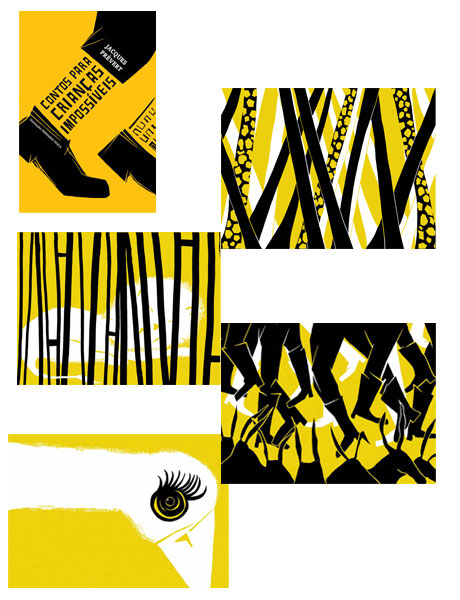| |
Contos para crinaças impossíveis
Jacques Prévert
Ilustrações: Fernando Vilela
Tradução: Alexandre Barbosa de SouzaCosac & Naify,2007
Formato: 15 x 23,5 cm, 64 p.
ISBN 978-85-7503-566-5
O grande escritor francês Jacques Prévert encampa um discurso provocativo, em histórias cujos personagens são animais. Ora um dromedário sente-se ofendido ao ser chamado de camelo, ora um jovem leão revolta-se contra o adestrador, ora um cavalo clama em voz uníssona por liberdade. Os bichos de Prévert não são como os da maioria das histórias infantis - ingênuos, politicamente corretos, obedientes. Fantasioso, mas ao mesmo tempo, sobre o pano de fundo da realidade, o livro não poupa o leitor. As sintéticas ilustrações de Fernando Vilela aproximam o abstrato e o figurativo, espelhando a densidade do livro e adentrando o registro das artes plásticas. Se o livro foi escrito originalmente em 1947, durante a ocupação nazista na França, o projeto gráfico explora a linguagem de cartaz, uma referência direta a outro momento da história política francesa: Maio de 68. Um livro para crianças impossíveis ficarem ainda mais "impossíveis", para o orgulho de pais e professores.
Tales for naughty children
Jacques Prévert
Ilustrations: Fernando Vilela
Translation: Alexandre Barbosa de Souza
Publisher: Cosac & Naify, 2007
Size: 15 x 23,5 cm
Paperback: 64 pages
ISBN 978-85-7503-566-5
The great writer, Jacques Prévert, takes over a provoking discourse in stories whose characters are animals. Either a dromedary gets hurt when someone calls him a camel, or a young lion rebels against the tamer, or a horse pledges in a loud voice for freedom. Prévert’s animals are not like the ones found in majority of children’s stories – naïve, politically correct and obedient. Fanciful, but with the background of reality, the book makes the reader slip into the story. The concise illustrations by Fernando Vilela approach the abstract and the descriptive, mirroring the book’s reality and deepening into the artistic register.
As the book was written in 1947, amidst Nazi occupation, the graphic project explores the pamphlet language, and its open reference to another moment of the history of French politics: May 68. A book to make naughty children get even naughtier and to make parents and teachers pride or them.
|
 |
